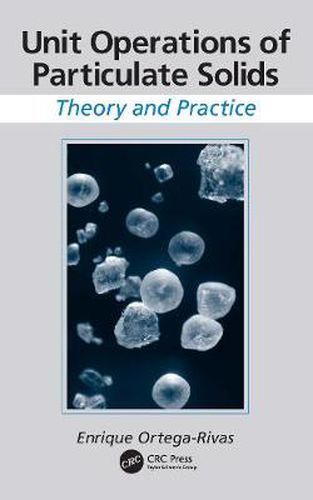Readings Newsletter
Become a Readings Member to make your shopping experience even easier.
Sign in or sign up for free!
You’re not far away from qualifying for FREE standard shipping within Australia
You’ve qualified for FREE standard shipping within Australia
The cart is loading…






Suitable for practicing engineers and engineers in training, Unit Operations of Particulate Solids: Theory and Practice presents the unit operations in chemical engineering that involve the handling and processing of particulate solids. The first part of the book analyzes primary and secondary properties of particles and particulate systems, focusing on their characterization and the effects on selection and design of silos and conveyors. Covering the main industrial operations of dry solids processing, the second part offers insight into the operation principles of the most important technologies that handle dry solids in bulk. With an emphasis on two-phase and multiphase flow, the final part describes all of the relevant systems in industrial processes that combine two different components of the state of matter as well as technologies for separating phases by purely mechanical means. Through clear explanations of theoretical principles and practical laboratory exercises, this book provides an understanding of the behavior of powders and pulverized systems. It also helps readers develop skills for operating, optimizing, and innovating particle processing technologies and machinery in order to carry out industrial operations, such as centrifugation, filtration, and membrane separations.
$9.00 standard shipping within Australia
FREE standard shipping within Australia for orders over $100.00
Express & International shipping calculated at checkout
Suitable for practicing engineers and engineers in training, Unit Operations of Particulate Solids: Theory and Practice presents the unit operations in chemical engineering that involve the handling and processing of particulate solids. The first part of the book analyzes primary and secondary properties of particles and particulate systems, focusing on their characterization and the effects on selection and design of silos and conveyors. Covering the main industrial operations of dry solids processing, the second part offers insight into the operation principles of the most important technologies that handle dry solids in bulk. With an emphasis on two-phase and multiphase flow, the final part describes all of the relevant systems in industrial processes that combine two different components of the state of matter as well as technologies for separating phases by purely mechanical means. Through clear explanations of theoretical principles and practical laboratory exercises, this book provides an understanding of the behavior of powders and pulverized systems. It also helps readers develop skills for operating, optimizing, and innovating particle processing technologies and machinery in order to carry out industrial operations, such as centrifugation, filtration, and membrane separations.